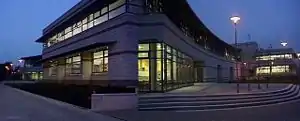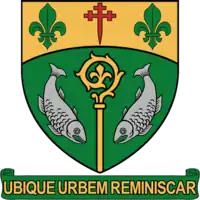Letterkenny Institute of Technology
Letterkenny Institute of Technology (LYIT) (Irish: Institiúid Teicneolaíochta Leitir Ceanainn), formerly the Regional Technical College, Letterkenny (and still often referred to as The Regional, particularly by older citizens), is a third level institution designed in the second half of the twentieth century for Donegal and others parts of north-west Ireland.
Institiúid Teicneolaíochta Leitir Ceanainn | |
 | |
| Established | 1971 |
|---|---|
| President | Paul Hannigan |
| Registrar | Billy Bennett |
| Students | 5,000 |
| Address | Port Road, Letterkenny, Ireland. , , |
| Website | http://www.lyit.ie |
Based at Letterkenny in County Donegal, it is one of the smaller places of third level education in the historic province of Ulster, with a lower student intake than other colleges such as Belfast Metropolitan College and the regional colleges of the North West, South, South East and South West, all of which themselves are smaller than the universities in Belfast and Belfast/Coleraine/Derry/Jordanstown.
History
Letterkenny was rejected as a suitable site for a Regional Technical College, though this was later overturned.[1] It is one of the original networks of Regional Technical Colleges established in various towns decided to be suitable for the requirements (such as Carlow in the south east and Dundalk, north of the capital Dublin), namely to deal with the chronic shortage of technicians with the skills required to enter the workforce. Messrs Mehon and MacPhillips were brought from Kilkenny as contractors of the building.[2] The Regional Technical College, Letterkenny's construction occurred in the absence of any clarity as to its purpose or function and such was the rapidity of work that the provision of information about services that the building would contain was not disseminated with any efficiency - in other words, the services were of secondary importance to getting the building off the ground.[3] It opened in 1971, with Danny O'Hare as first principal (1971-1974).[4]
The Regional was also referred to as Donogh O'Malley Regional Technical College, Letterkenny, until 1992, in honor of Donogh O'Malley, TD, the reforming Minister for Education.
The Regional's earliest history, founded so soon after the cataclysm of France in May 68, was marked by dispute and unrest. In the 1970s, the Donegal News reported that "About 39 men walked off the site... of the new School of Technology, Port Road, Letterkenny on Monday morning". The "stoppage of work", the newspaper said, was a "protest".[2]
By the mid-1990s, numbers attending the Regional Technical College had declined substantially as universities came to be viewed as the better option.[5]
In 1994, following concerns about the management of the Regional Technical College, the management board was replaced by a commission appointed by the Minister of Education. In 1996 the minister restored the governance and management to the RTC.[6]
In late 1997, a rebranding exercise determined the adoption of the title "Letterkenny Institute of Technology", to move it in line with the other Regional Technical Colleges scattered in various other urban settlements throughout the country.
A Higher Education Authority (HEA) report published in December 2020 showed that the institution had the highest proportion nationally of attendees from impoverished, disadvantaged backgrounds, with only 3 per cent of those in attendance being from a background where wealth was in evidence.[7] The average household income for anyone attending the Letterkenny facility was €35,853, a steep decline on the national average of €49,603.[7]
Schools and Departments
|
|
|
|
Courses
The institute offers over 130 programmes that range from one to four years in computing, engineering, design, science, the "social science" of business, veterinary practice, nursing and law. The courses are offered at levels 6 through 10 on the NQAI framework. Courses are offered in a semesterised and modularised method. Specialist courses that may be found in LYIT include the Bachelor of Science (Hons) in Fire Safety Technology [8] which is the only one of its kind in Ireland, other specialist degrees also include Bachelor of Science (Hons) In Analytical and Forensic Science. The Technical College is one of only two institutes in Ireland to offer degrees approved by the King's Inns. The BA (Hons) in law has been approved degree status by the society.[9] The Institute also co-operates closely on many courses and much research with Magee College, part of the University of Ulster, in nearby Derry[10]
The institute also offers support for businesses through specialized short-term courses, collaborative research, and the Co-Lab.
Sport
The college offers various sports teams and has reached many awards and trophies in recent years:[11]
In 2017, the basketball team won a Division 2 College title, while the following year the ladies' basketball team won a College title as well.
The association football team finished as losing finalists in the CUFL League Finals in 2018. The ladies' soccer team won both the championship for all of the Division 1 Colleges league and the O'Regan Plate competition in 2018.
Though it is unable to compete at the top level of Gaelic football - where the traditional university teams and a small selection of lesser third-level institutions are to be found - LYIT does manage to put together a team at times. It would, however, be rare to find a player in it who has attained any recognition at the elite inter-county level of the sport. For any such players as these, one might have more luck searching the teams of the Universities of Galway or Dublin (City or University College). Nevertheless, men representing LYIT did win a Trench Cup in 2019. They then opted to contest the 2020 Sigerson Cup, not once meeting any of the universities and coming undone against an unfancied IT Carlow, in part through lack of discipline, and with the game taking place in their own province at that.[12]
LYIT hurling's last success was winning the fourth tier Corn MacDiamada competition during the 2015–16 season.
Associated college
The Coláiste Turasóireachta Na Cealla Beaga (Tourism College Killybegs), founded in 1969, and adopting its current name in 1992, is an academic school of the institute, in accordance with the Institutes of Technology Act 2006.[13] The School of Tourism is located on a five-acre site on the Shore Road overlooking Killybegs Harbour. The School is a hub of activity providing business and practical training which prepares graduates for a wide variety of careers in culinary arts, hospitality management, and tourism.
Achievements
With Tallaght, it came joint second to the Galway-Mayo in The Sunday Times University Guide 2007, (though not universities, this guide also ranked the technical colleges after dealing with the top universities). Letterkenny also had the country's best record for providing third-level education to disadvantaged students.[14][15]
Partnerships
Letterkenny is attempting to work in co-ordination with Galway-Mayo and Sligo to form a Technological University for the West/North-West of Ireland.[16] In October 2020, the constituent IT's were allocated over €5.5 million towards transformation.[17]
Notable alumni
- Nikki Hayes, DJ and radio presenter
- Jerome Hughes, TV3 News reporter
- Sean Fingleton, artist[18]
- Grainne Gallanagh, Miss Universe Ireland 2018
- Tarla MacGabhann, Irish architect
See also
References
- Doyle, Louise (12 November 2020). "The Way We Were - 25 Years Ago: November 11, 1995 - Blaney's record praised". Donegal News. p. 18.
- McLoughlin, Laura (20 February 2020). "The Way We Were - 50 Years Ago: February 28, 1970 - 30 men walk out at Letterkenny college". Donegal News. p. 22.
- Doyle, Louise (16 July 2020). "The Way We Were - 50 Years Ago: July 18, 1970 - Let's have the programme for the new technical college now". Donegal News. p. 18.
...there is yet no clear picture emerging [at the time of its construction] as to its actual place in the community. The people are not aware as to the courses and services that will be open to them with the completion of the building.
- O'Connor, Alison (9 November 1996). "Hoping to find the right recipe". Irish Times. Retrieved 21 January 2021.
- Doyle, Louise (10 September 2020). "The Way We Were - 25 Years Ago: September 9, 1995". Donegal News. p. 18.
After one of the most difficult periods in the [Letterkenny Regional Technical] College's history, student numbers dropped by up to 200... reports this summer that regional technical colleges were losing in popularity as students sought university places.
- Connolly, John. "Minister to restore governance of RTC", The Irish Times, 15 October 1996.
- McLoughlin, Laura (10 December 2020). "Study reveals home truths about Donegal". Donegal News. p. 32.
- "Archived copy". Archived from the original on 15 December 2007. Retrieved 19 September 2008.CS1 maint: archived copy as title (link)
- King's Inns Approval for law degrees at LYIT Letterkenny Post 29 August 2008
- "Letterkenny Institute Technology Scholarship". Afterschool.
- https://www.lyit.ie/Student-Hub/Sports-Recreation/Sports-Teams
- Bannon, Dan (22 January 2020). "Farrell to the fore as Carlow hit LIT late". RTÉ Sport. Retrieved 22 January 2020.
Letterkenny lost their corner forward Darragh Black to a second yellow card and to compound matters further they lost their full-back Mark McAteer to a black in the next attack. That indiscipline was a huge turning point in the game and Carlow stunned the Donegal side with 1-04 to no reply to give themselves a healthy four point cushion.
- INSTITUTES OF TECHNOLOGY ACT 2006 Irish Statute Book 2006
- Letterkenny Second in IT awards
- "Trinity grabs top university award", Irish Examiner, 29 September 2007
- Marren, Aisling (12 October 2018). "HEA Invests €800,000 in Four Institutes of Technology". The University Times. Trinity College Dublin. Archived from the original on 12 October 2018. Retrieved 21 November 2018.
- "Connacht-Ulster Alliance (LYIT, GMIT and IT Sligo) allocated €5.7m under Transformation Funding for Technological Universities". Letterkenny Institute of Technology.
- Sean Fingleton Collection at Letterkenny Institute of Technology www.visualarts.ie, October 4, 2019.
